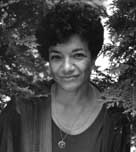|
Roberta J Hill: Two Poems
The Dawn Tree Speaks in The Sculpture Garden | This Dayís God
The Dawn Tree Speaks in The Sculpture Garden
She called me "The Dawn Tree." That dreaming babe
believed in life and love. She ignored the crap
the establishment dishes out. I watched her eat
one raisin at a time, scrutinizing each for its design,
the wrinkles she would get if she didnít quit worrying.
She chewed them as thoroughly as her life. Me? Why,
Iím a bitch, a creation, painted flat black
while others got flat white. We grew our groins
and trunks and intersections. Yes, you prick,
ok, so she picked up scrap from pissed-on floors
or boarded up buildings, street trash she turned
into something special, seeing that we saw it all
—from boots and dirty low down dogs to how beliefs
going wrong made some slob puke
her guts out in a gutter. Hey, she worked hard
to survive artistic clutter, despite those
pissant curators the New York scene preened
around her when she got old. Her red hair must
have kept her glowing, angry enough to insist
—better lives for everyone around. Curators make me
gnaw my seams; if I could, Iíd use these curvy limbs
to cover all cash with bile. What a woman
that Louise! How she believed in everyone. Called me
her dawn tree. Do you believe that? Me?
Said I should imagine myself
a larch in the mountains of the Ukraine,
woven from pain, boisterous with belief,
birds singing in my rare branches.
Hells bells, I try to be true
to her vision, but would isnít my nature.
Do you believe I am? A larch, I mean, in the mountains
of Ukraine, beautiful even, same as you?
  
This Dayís God
The cat-eyed god comes
to settle with hands folded in
his lap, looking like
heís bout to take a nap.
"Knew your grandpa. Loved him too,"
he mews. "Sometimes painís just pain."
"I donít want to be bound
to old salvation stories," she says,
refusing to budge from her bed.
"Donít want to give my soul
away so someone else can whistle.
Canít go on feeling
subjugated by my thinking
that I canít do anything
good. Whereís a power line
linking heart, mind, hand and tongue?"
"No need to worry. Believe," he says
with a big relaxing yawn,
stretching from rounded nose to groin,
feet, arching back, a wave seething up
then down. "Iím goiní to tell you
the only way round
the impossible," he says, shaking
his head once, looking up
at the sky gone blue from trunks
in snow to the well above. "Love,"
he says, "is where weíre from.
No need to wait in hate when nothing
comes. Invoke an opening for
bliss every moment because it
sticks us all together—every which way.
I told your grandpa this secret and
though he missed sometimes,
he mostly got it right. Magic
shone in bean fields where he worked
for twenty bucks a month,
magic through him when he blew
cornet for white folks
who thought Indians did nothing
but sleep. Magic when your
grandma had cold feet and refused
to marry." His cat eyes reflect the sky,
a speckled cloud. Ocelot god
wears his fur as the pride of composed
thought. "Magic makes ways
to freedom. Sometimes
painís just pain."
He rose from her bed, turned
and melted into a melody played
with penny whistles, flutes and drums.
The Milky Way stood
on its head when he turned
into a brisk wind purling round
her feet. She got
out of bed and stepped
on the floor. What more
did she want than this chance
to change, this urge to whistle
for no reason.

Poet's Biography:
 |
Roberta J. Hill, an enrolled member of the Oneida Nation of Wisconsin, is a poet, fiction writer and scholar. She earned her bachelorís degree from the University of Wisconsin, MFA from the University of Montana and Ph.D. in American Studies from the University of Minnesota. A professor of English and American Indian Studies at the University of Wisconsin, she has received a Lila-Wallace Readerís Digest Award, among others. Hill is the author of two collections of poetry, Star Quilt (Holy Cow! Press, 1984, and a fifteenth anniversary edition due out this year) and Philadelphia Flowers (Holy Cow! Press, 1996). Her poetry has been selected for inclusion in the St. Paul Poetry Garden and the Midwest Express Convention Center in Milwaukee. Her fiction, poetry and essays have appeared in a number of anthologies and magazines, most recently in The Beloit Poetry Journal, Luna and Prairie Schooner. She is currently completing the biography of her grandmother, Dr. Lillie Rosa Minoka-Hill, the second American Indian woman physician, to be published by the University of Nebraska Press.
|
|


